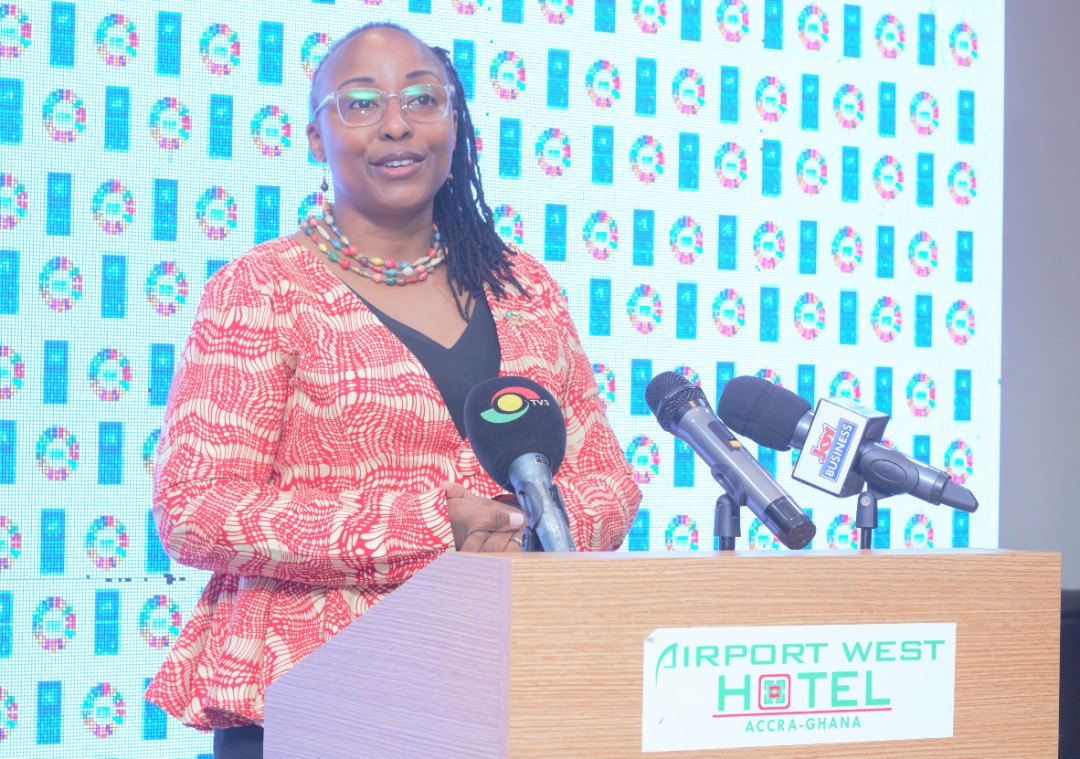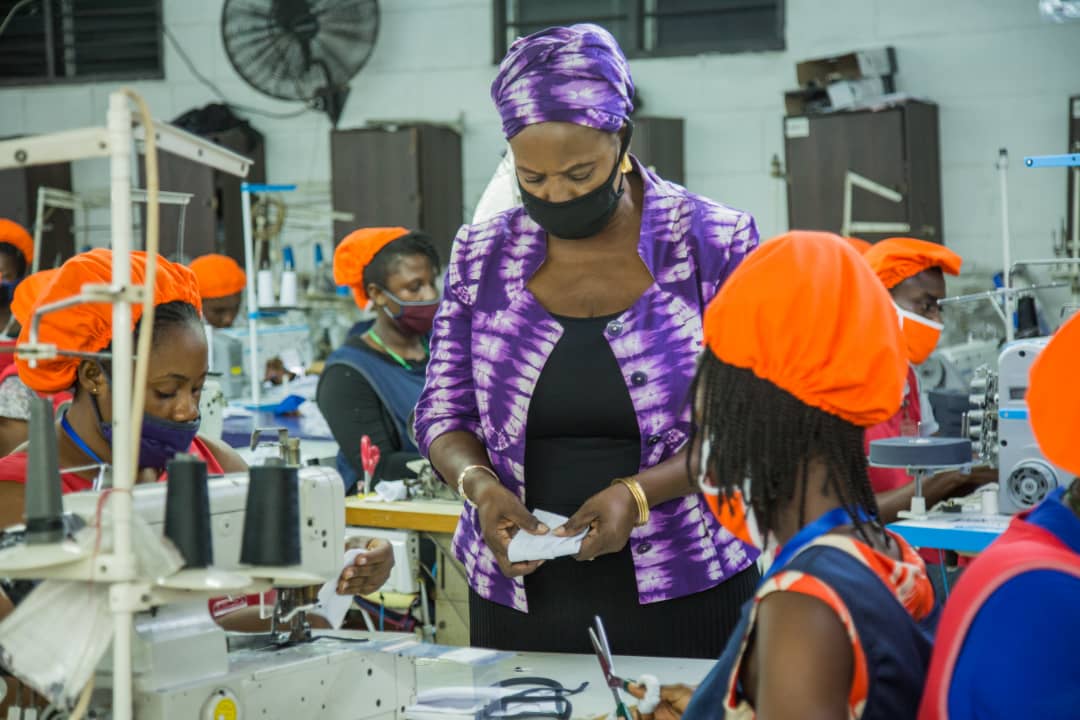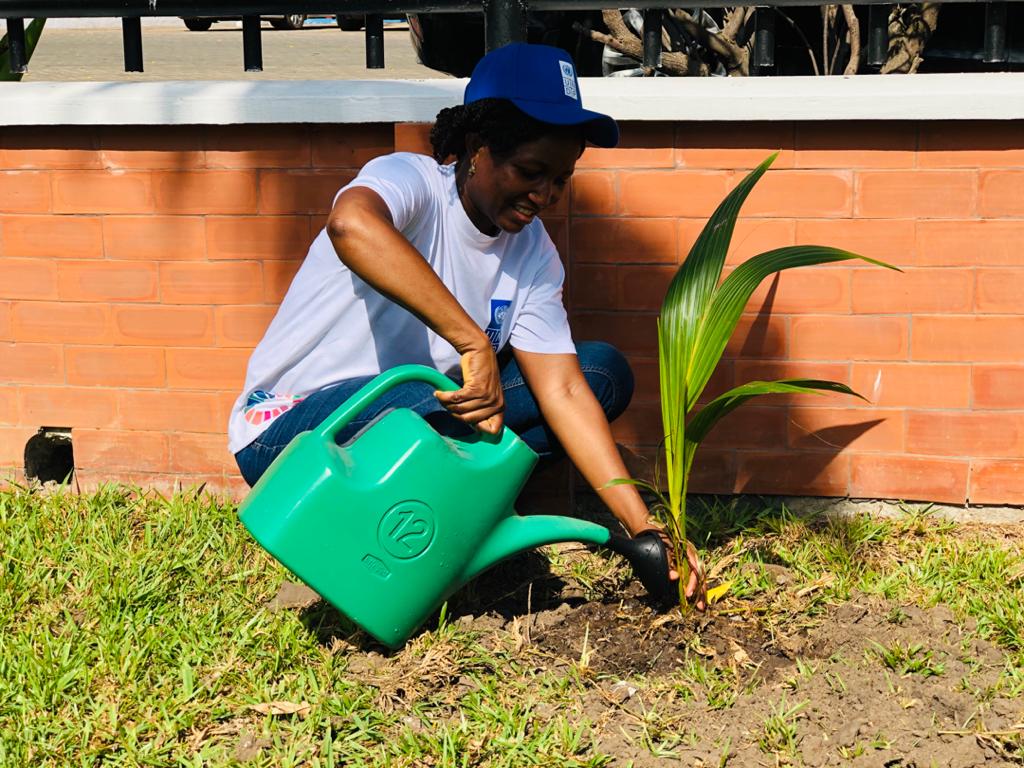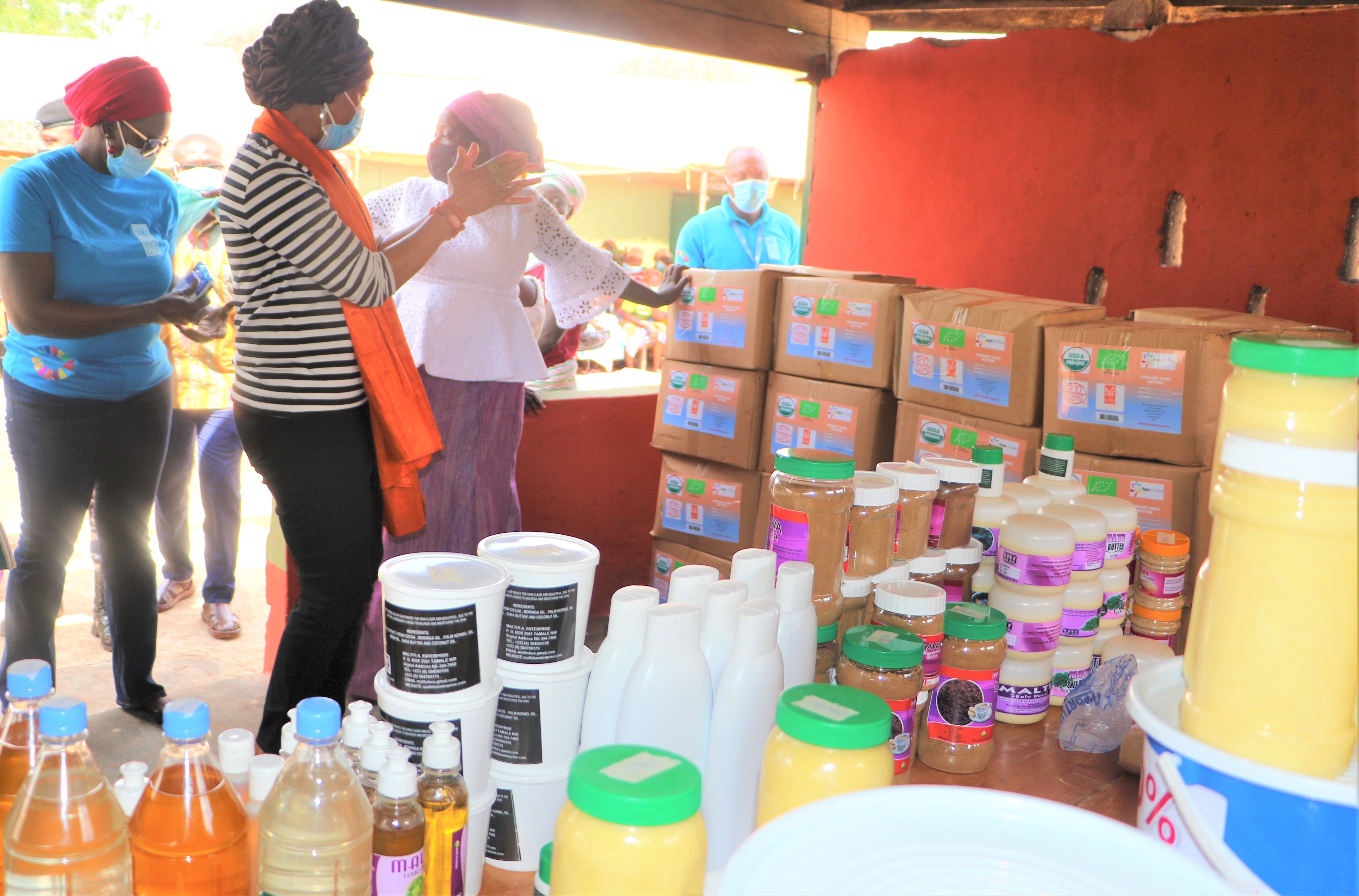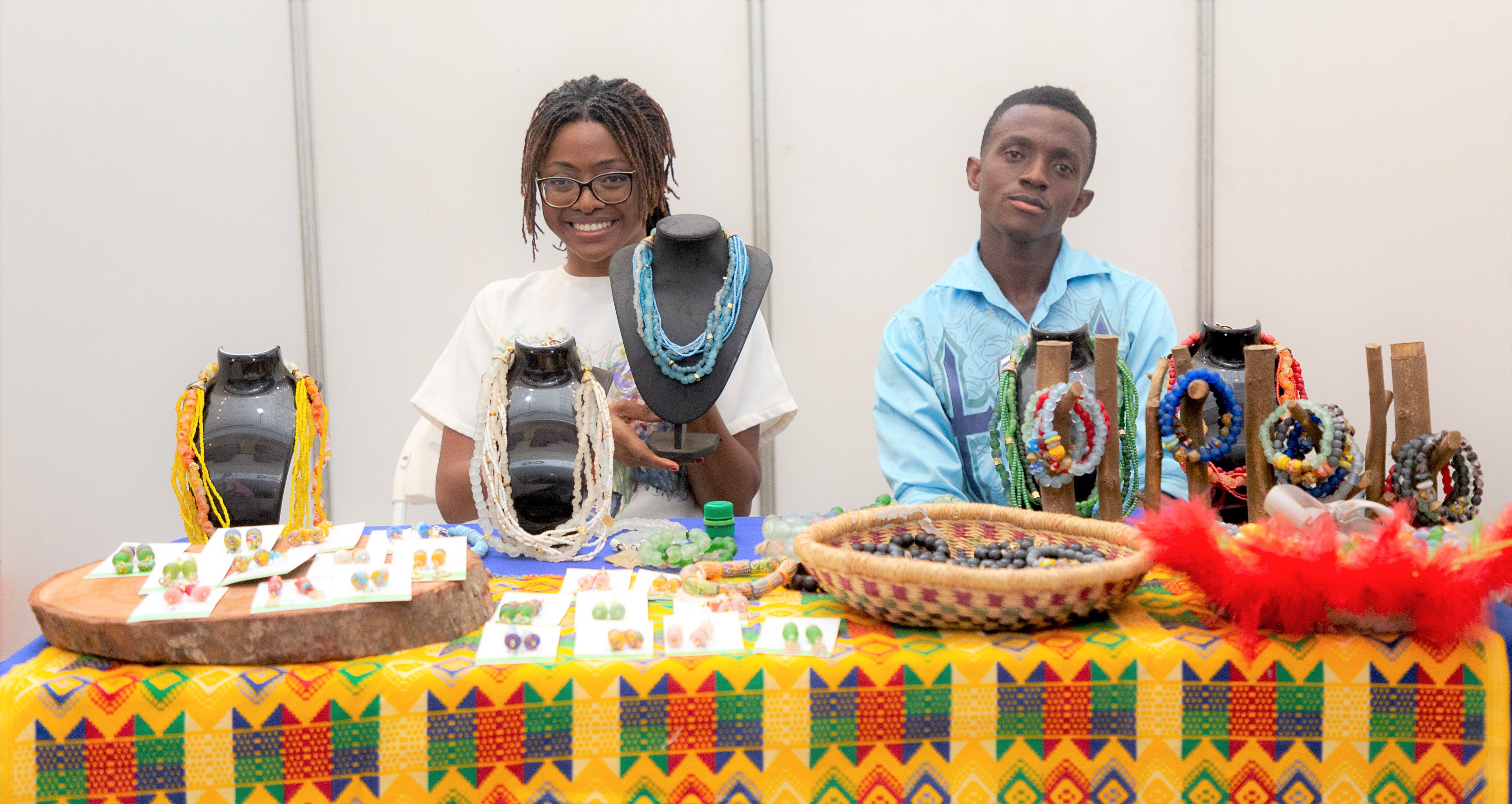How UNDP solution mapping, communication spotlight and financial support attracted partnerships to change the fortunes of a waste recycler in Ghana.
Ibrahim Yougbare, popularly known as Alinko, a waste recycler at work. Photo: Priscilla Mawuena Adjeidu/UNDP Ghana.
“We live in a world of plastics and this is money all around us when we put it to good use”, stressed Ibrahim Yougbare, popularly known as Alinko, a recycler, whose passion for plastic waste recycling is an inspiration.
Alinko with tons of plastics he and his workers have collected for recycling. Photo: UNDP Ghana.
Working in the waste recovery sector for over 30years, Alinko uses recycled plastic waste to produce chair leg floor protectors, curtain ropes and plastic lumber for furniture. His fortunes changed overnight after his waste recycling work was identified and showcased on social media by the United Nations Development Programme (UNDP) in Ghana through a video story. The documentary was produced under the solutions mapping initiative of the UNDP Accelerator Lab in Ghana, in collaboration with the Ghana Waste Recovery Platform, being facilitated by UNDP.
“I received a call one day and it was the CEO of Footprint Africa, Joana and she said, we saw your video on one of UNDP’s social media platforms, will you be interested in a business incubation opportunity? I was dumbfounded”, Alinko narrated.
Alinko seized the opportunity and after seven months, Footprint Africa presented a grant scheme opportunity. He applied, and subsequently received a cash amount of 25,000 pounds, which he invested into his enterprise, enabling him to expand.
Workers producing curtain ropes from recycled plastics. Photo: UNDP Ghana.
“My connection with UNDP has been a breakthrough. When I thought Footprint was enough, the European Union (EU) also came in few months later. One thing is constant, these granters kept referring to the UNDP documentary I got featured in. EU also mentioned our business incubation journey with Footprint and opted to expand our plastic business”, he reported.
Alinko, was awarded 400,000 euros by the European Union through Asase Foundation, to establish a waste recycling factory and he acquired a 10-acre land for the establishment of the factory. The EU is also supporting him with a Project Manager and 5 more staff to support him in the implementation.
Moreover, he also applied for the second edition of the UNDP Waste Innovation Challenge, supported by the Coca Cola Foundation, and luckily, he won and received USD36,000 grant, part of which he has invested in purchasing a new extruder. This means more plastics will be recycled to ease the burden on the planet.
Alinko's old extruder.
The new extruder.
At Pyramid Recycling Enterprise, Alinko was formerly recycling about 5.6 tons of plastics a week. However, thanks to the additional supports, he is able to recycle up to 11.2 tons of plastics per a week.
Alinko with plastic lumber raw material. Photo: Priscilla Mawuena Adjeidu/UNDP Ghana.
The Plastics Menace
Plastic pollution is a major development challenge across the world. Research shows that, Ghana alone generates about 1million tons of plastic waste annually. Out of this, only 2-5% (22,000-55,000) is recycled. The rest ends on landfill (38%), land (28%), sea (23%), or burned (11%).
People like Alinko are stepping in to provide some solutions. Alinko’s journey started when his dad offered him the opportunity to work in his recycling company when he completed his sixth form education. After spending 3years in his dad’s company, he transformed his sister’s garage into an office and set up Pyramid Recycling Enterprise to produce curtain ropes and the residue he uses for chair leg floor protectors to prevent slippery.
“One day, I brought a carpenter to renovate my office. Anytime he hits the nail on the wood pallet, the wood breaks. There I thought to myself, this wood could be replaced with plastic.
After 2 years of conceptualizing the idea, Alinko produced the first plastic lumber prototype which went through a testing process at the Council for Scientific and Industrial Research (CSIR) in Ghana. This was then presented to the Accra Metropolitan Assembly, who then recommended his innovation to the UNDP.
Alinko with a plastic lumber he has produced for making furniture. Photo: UNDP Ghana.
A Profitable Venture
According to Alinko, the waste recycling business is a profitable one and he is ploughing back profits to make his business self-sustaining. He revealed that one is likely to make about 40 percent profit on any capital invested into the business. He also noted that, the venture needs a lot of hands, and he is able to support other young people with gainful employment and experience to improve livelihood.
So far, Pyramid Recycling Enterprise employs 30 people: 10 fixed-term workers out of whom 7 are women and 3 are men, and 20 temporary workers. The Enterprise is also indirectly improving the income of over 100 waste collectors and plastic pickers in Ghana.
A waste collector engaged by Pyramid Enterprise. Photo: UNDP Ghana.
Alinko and his staff in a group photo with UNDP Staff (first two, 1st row on the right).
“Working here has really impacted me. I have had countless opportunities to learn, get certificates through trainings and practice the use of machines here. It has been a good journey for me with Pyramid”, Rafatu Zachari, Assistant Technical Engineer at Pyramid Recycling Enterprise noted.
Rafatu Zachari, Assistant Technical Engineer at Pyramid Recycling Enterprise at work. Photo: Priscilla Mawuena Adjeidu/UNDP Ghana.
Alinko’s story is yet another good example of how effective communication can attract critical partnerships to upscale innovations for sustainable development. As required by the fifth target of the Sustainable Development Goal (SDG) 12, together we can support the next “Alinko”, and substantially reduce waste generation through prevention, reduction, recycling and reuse. More supports for many young innovators mean killing two birds with one stone: reduce plastic pollution and turn waste into valuable resources.
A worker with Pyramid's curtain ropes. Photo: UNDP Ghana
Chair leg floor protectors produced from recycled plastics by Pyramid Enterprise. Photo: UNDP Ghana.
UNDP Team with Alinko, to produce the documentary that brought him the partnerships.
###
Footnote: Story by Praise Nutakor and Priscilla Mawuena Adjeidu/UNDP Ghana.

 Locations
Locations
